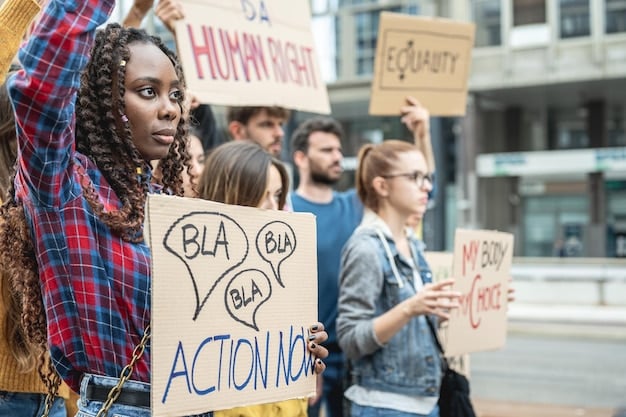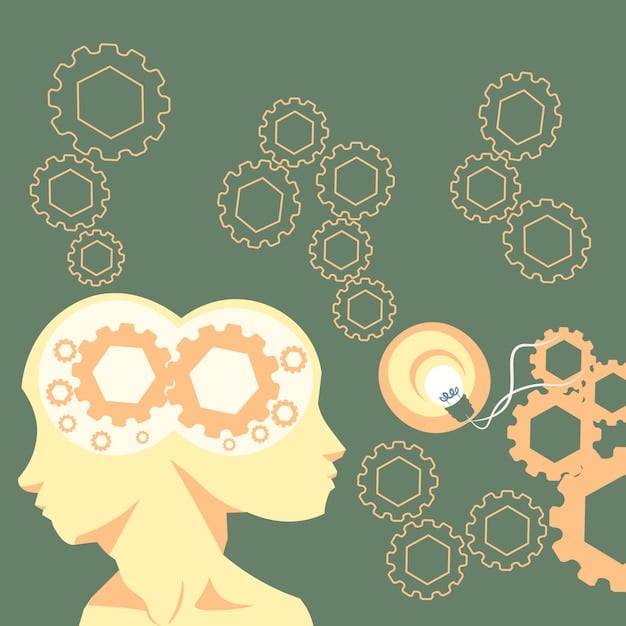Mental Health & Social Justice: Addressing Needs in US Communities

Mental health and social justice intersect significantly, requiring tailored approaches to support activists and marginalized communities in the US who face unique stressors and systemic barriers impacting their well-being.
The intersection of mental health and social justice: How can we address the unique needs of activists and marginalized communities in the US? is a critical area of concern, especially given the heightened stress and trauma experienced by those working for change and those facing systemic inequities every day.
Understanding the Intertwined Nature of Mental Health and Social Justice
Mental health isn’t just an individual concern; it’s deeply connected to the social, political, and economic environments in which people live. For marginalized communities and activists, these environments often present unique challenges that significantly impact mental well-being. Recognizing this connection is the first step towards creating effective support systems.
Systemic Oppression and Mental Health
Systemic oppression, including racism, sexism, homophobia, and other forms of discrimination, creates chronic stress and trauma. This constant exposure to injustice can lead to a range of mental health issues. Understanding how these systems affect mental health is vital.
The Activist’s Dilemma: Burnout and Trauma
Activism, while empowering, can also be incredibly demanding. Activists often face burnout, vicarious trauma, and direct threats to their safety, further compounding the mental health challenges they face.
- Burnout: Defined by exhaustion, cynicism, and feelings of ineffectiveness.
- Vicarious Trauma: Emotional residue from witnessing or hearing about others’ trauma.
- Direct Threats: Verbal abuse, harassment, or physical violence.

By acknowledging these challenges and implementing targeted interventions, we can begin to address the mental and emotional well-being of those who dedicate their lives to fighting for a more just and equitable world.
The Unique Mental Health Needs of Marginalized Communities
Marginalized communities often experience higher rates of mental health challenges compared to the general population. This disparity is due to a combination of factors, including limited access to resources, historical trauma, and ongoing discrimination.
Historical Trauma and Intergenerational Impact
Historical trauma, such as the legacy of slavery for African Americans or the forced assimilation of Native Americans, continues to impact mental health across generations. Understanding the deep roots of this trauma is key to providing culturally sensitive care.
Access to Culturally Competent Care
Culturally competent mental health care is essential for marginalized communities. Providers must understand and respect the cultural backgrounds and lived experiences of their clients to provide effective treatment.
- Language Barriers: Offering services in multiple languages.
- Cultural Beliefs: Respecting differing views on mental health.
- Community Involvement: Engaging community leaders for outreach.
Addressing these unique needs requires a multi-faceted approach that includes increasing access to culturally competent care, addressing systemic inequalities, and promoting community-based solutions. A comprehensive strategy can make meaningful progress in improving the overall mental well-being of marginalized communities.
Strategies for Supporting Activists’ Mental Health
Activism is a vital force for social change, but it can take a significant toll on the mental health of those involved. Implementing strategies to support activists’ well-being is crucial for sustaining their work and preventing burnout.
Building Resilience and Coping Mechanisms
Resilience is the ability to bounce back from adversity. Helping activists develop healthy coping mechanisms can mitigate the negative impacts of their work. Recognizing and reinforcing coping mechanisms can be very beneficial.
Creating Safe Spaces and Support Networks
Safe spaces where activists can connect with peers, share their experiences, and receive support are invaluable. These networks provide a sense of community and reduce feelings of isolation.
- Peer Support Groups: Facilitated discussions among activists.
- Therapy and Counseling: Affordable and accessible mental health services.
- Mindfulness Practices: Techniques for stress reduction, such as meditation.

By providing activists with the resources and support they need, we can help them thrive in their roles as change agents and prevent burnout. Sustainable activism requires a focus on individual and collective well-being.
Policy Changes and Systemic Solutions
While individual support is essential, addressing the root causes of mental health disparities requires policy changes and system-level interventions. Advocacy for equitable policies is necessary to create lasting change.
Advocating for Accessible Mental Health Services
Ensuring everyone has access to affordable and quality mental health services is a fundamental step. This includes expanding Medicaid coverage, increasing funding for community mental health centers, and addressing the shortage of mental health professionals.
Addressing Social Determinants of Health
Social determinants of health, such as poverty, housing insecurity, and food insecurity, significantly impact mental health. Policies that address these issues can have a positive ripple effect on mental well-being.
- Affordable Housing: Reducing housing instability and homelessness.
- Living Wage: Ensuring people can meet their basic needs.
- Access to Education: Promoting economic mobility and opportunity.
By advocating for policies that promote equity and address social determinants of health, we can create a more just and supportive society for everyone. Systems must also be held accountable for the services that they provide.
Community-Based Approaches to Mental Health
Community-based approaches to mental health are particularly effective in addressing the unique needs of marginalized communities and activists. These approaches prioritize local resources and cultural responsiveness.
Empowering Local Organizations
Supporting and empowering local organizations that are already working in marginalized communities can strengthen existing support systems. These organizations often have a deep understanding of the community’s needs and can provide culturally sensitive care. Providing financial and other resources to these groups can drastically improve mental health assistance.
Integrating Mental Health into Existing Services
Integrating mental health services into existing community programs, such as schools, community centers, and primary care clinics, can increase access and reduce stigma. This integration ensures that mental health is treated as an integral part of overall health.
- School-Based Mental Health: Providing counseling and support in schools.
- Community Health Workers: Training community members to provide basic mental health support.
- Mobile Mental Health Units: Bringing services to underserved areas.
By investing in community-based approaches, we can create sustainable and culturally relevant mental health systems that meet the needs of marginalized communities and support the well-being of activists.
The Role of Education and Awareness
Education and awareness are critical components of any comprehensive strategy to address mental health and social justice. Reducing stigma and promoting understanding are essential for creating a more supportive society.
Reducing Stigma Around Mental Health
Stigma prevents people from seeking help when they need it. Education campaigns can help to dispel myths and misconceptions about mental illness and promote a more accepting culture. Public support from celebrities and other social leaders can also help diminish the stigma present today.
Promoting Mental Health Literacy
Mental health literacy is the ability to recognize, manage, and seek help for mental health problems. Providing education about mental health can empower individuals and communities to take control of their well-being.
- Workshops and Training: Providing education on mental health issues and coping skills.
- Public Service Announcements: Raising awareness through media campaigns.
- Online Resources: Offering accessible information and support.
By promoting education and awareness, we can create a society that is more understanding, supportive, and proactive in addressing mental health challenges. The more education that is available, the more people will feel comfortable seeking help.
| Key Topic | Brief Description |
|---|---|
| ⚖️ Social Justice | Focuses on fairness and equality in resources and opportunities. |
| 🧠 Mental Health | Encompasses emotional, psychological, and social well-being. |
| 🤝 Community Support | Essential for providing resources to support everyone’s needs. |
| 📚 Education | Promotes understanding, reduces stigma, and encourages support. |
Frequently Asked Questions
▼
Activism can be stressful and emotionally taxing. Prioritizing mental health helps activists sustain their efforts, prevent burnout, and remain effective advocates for change.
▼
Experiencing discrimination, oppression, and inequality can lead to chronic stress, trauma, and mental health issues such as depression, anxiety, and PTSD.
▼
Strategies include building resilience, creating safe support networks, providing access to therapy and counseling, and promoting self-care practices like mindfulness and meditation.
▼
Culturally competent care involves understanding and respecting the cultural backgrounds, beliefs, and values of individuals, and tailoring treatment approaches to meet their specific needs.
▼
Communities can promote mental health by advocating for equitable policies, supporting local organizations, integrating mental health services into existing programs, and raising awareness to reduce stigma.
Conclusion
Addressing the intersection of mental health and social justice: How can we address the unique needs of activists and marginalized communities in the US? requires a comprehensive and collaborative approach. By understanding the challenges, implementing targeted interventions, and advocating for systemic change, we can create a more just and mentally healthy society for all.





